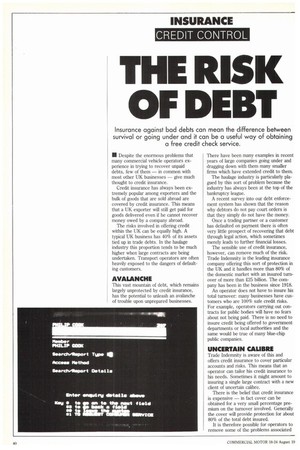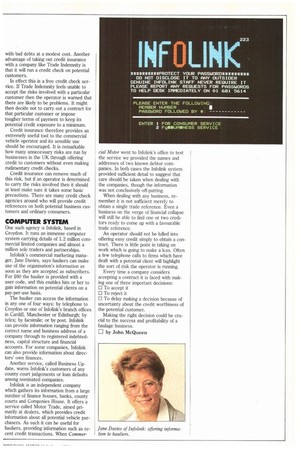THE RISK OF DEBT
Page 34

Page 35

If you've noticed an error in this article please click here to report it so we can fix it.
Insurance against bad debts can mean the difference between survival or going under and it can be a useful way of obtaining a free credit check service.
• Despite the enormous problems that many commercial vehicle operators experience in trying to recover unpaid debts, few of them — in common with most other UK businesses — give much thought to credit insurance.
Credit insurance has always been extremely popular among exporters and the bulk of goods that are sold abroad are covered by credit insurance. This means that a UK exporter will still get paid for goods delivered even if he cannot recover money owed by a company abroad.
The risks involved in offering credit within the UK can be equally high. A typical UK business has 40% of its assets tied up in trade debts. In the haulage industry this proportion tends to be much higher when large contracts are being undertaken. Transport operators are often heavily exposed to the dangers of defaulting customers.
AVALANCHE
This vast mountain of debt, which remains largely unprotected by credit insurance, has the potential to unleash an avalanche of trouble upon unprepared businesses. There have been many examples in recent years of large companies going under and dragging down with them many smaller firms which have extended credit to them.
The haulage industry is particularly plagued by this sort of problem because the industry has always been at the top of the bankruptcy league.
A recent survey into our debt enforcement system has shown that the reason why debtors do not pay court orders is that they simply do not have the money.
Once a trading partner or a customer has defaulted on payment there is often very little prospect of recovering that debt through legal action, which sometimes merely leads to further financial losses.
The sensible use of credit insurance, however, can remove much of the risk. Trade Indemnity is the leading insurance company offering this sort of protection in the UK and it handles more than 80% of the domestic market with an insured turnover of more than £25 billion. The company has been in the business since 1918.
An operator does not have to insure his total turnover many businesses have customers who are 100% safe credit risks. For example, operators carrying out contracts for public bodies will have no fears about not being paid. There is no need to insure credit being offered to government departments or local authorities and the same would be true of many blue-chip public companies.
UNCERTAIN CALIBRE
Trade Indemnity is aware of this and offers credit insurance to cover particular accounts and risks. This means that an operator can tailor his credit insurance to his needs. Sometimes it might amount to insuring a single large contract with a new client of uncertain calibre.
There is the belief that credit insurance is expensive — in fact cover can be obtained for a very small percentage premium on the turnover involved. Generally the cover will provide protection for about 80% of the total debt insured.
It is therefore possible for operators to remove some of the problems associated
with bad debts at a modest cost. Another advantage of taking out credit insurance with a company like Trade Indemnity is that it will run a credit check on potential customers.
In effect this is a free credit check service. If Trade Indemnity feels unable to accept the risks involved with a particular customer then the operator is warned that there are likely to be problems. It might then decide not to carry out a contract for that particular customer or impose tougher terms of payment to keep its potential credit exposure to a minimum.
Credit insurance therefore provides an extremely useful tool to the commercial vehicle operator and its sensible use should be encouraged. It is remarkable how many unnecessary risks are run by businesses in the UK through offering credit to customers without even making rudimentary credit checks.
Credit insurance can remove much of this risk, but if an operator is determined to carry the risks involved then it should at least make sure it takes some basic precautions. There are many credit check agencies around who will provide credit references on both potential business customers and ordinary consumers.
COMPUTER SYSTEM
One such agency ls Infolink, based in Croydon. It runs an immense computer system carrying details of 1,2 million commercial limited companies and almost a million sole traders and partnerships.
Infolink's commercial marketing manager, Jane Davies, says hauliers can make use of the organisation's information as soon as they are accepted as subscribers. For £60 the haulier is provided with a user code, and this enables him or her to gain information on potential clients on a pay-per-use basis.
The haulier can access the information in any one of four ways: by telephone to Croydon or one of Infolink's branch offices in Cardiff, Manchester or Edinburgh; by telex; by facsimile; or by post. Infolink can provide information ranging from the correct name and business address of a company through to registered indebtedness, capital structure and financial accounts. For some companies, Infolink can also provide information about directors' own finances.
Another service, called Business Update, warns Infolink's customers of any county court judgements or loan defaults among nominated companies.
Infolink is an independent company which gathers its information from a large number of finance houses, banks, county courts and Companies House. It offers a service called Motor Trade, aimed primarily at dealers, which provides credit information about all potential vehicle purchasers. As such it can be useful for hauliers, providing information such as recent credit transactions. When Commer cial Motor went to Infolink's office to test the set-vice we provided the names and addresses of two known debtor companies. In both cases the Infolink system provided sufficient detail to suggest that care should be taken when dealing with the companies, though the information was not conclusively off-putting.
When dealing with any business, remember it is not sufficient merely to obtain a single trade reference. Even a business on the verge of financial collapse will still be able to find one or two creditors ready to come up with a favourable trade reference.
An operator should not be lulled into offering easy credit simply to obtain a contract. There is little point in taking on work which is going to make a loss. Often a few telephone calls to firms which have dealt with a potential client will highlight the sort of risk the operator is running.
Every time a company considers accepting a contract it is faced with making one of three important decisions: El To accept it 0 To reject it
0 To delay making a decision because of uncertainty about the credit worthiness of the potential customer.
Making the right decision could be crucial to the success and profitability of a haulage business.
by John McQueen










































